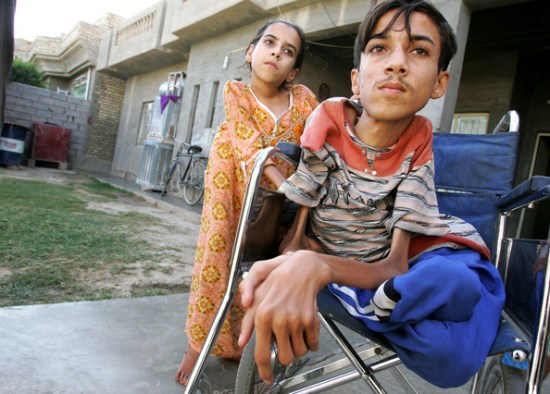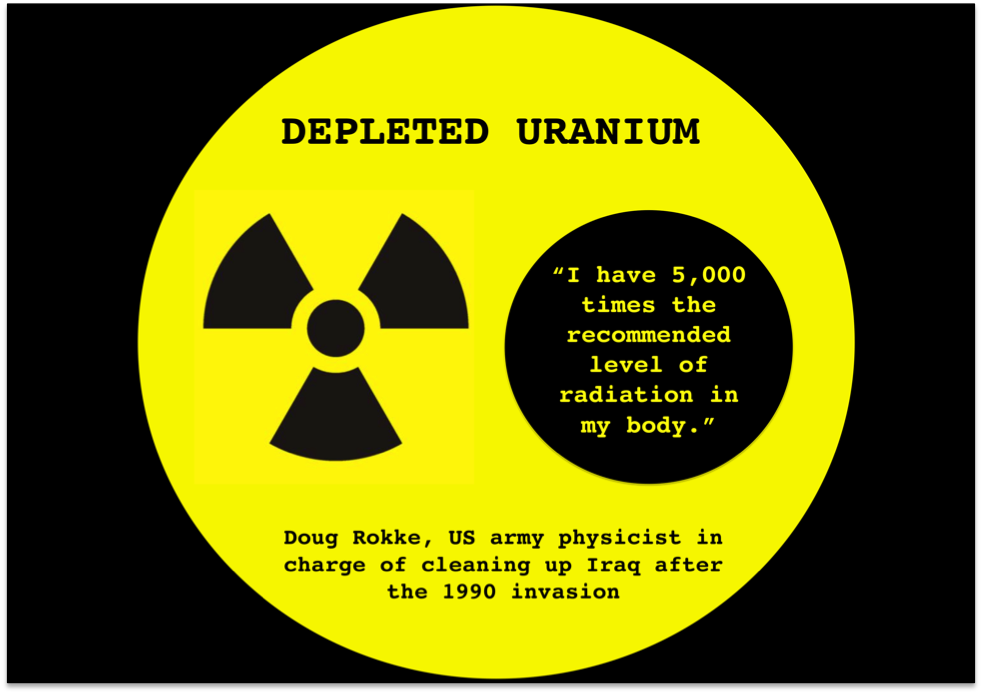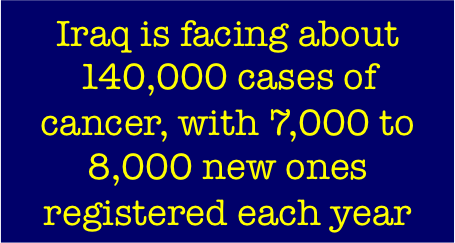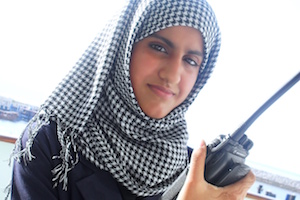 lBy Aliza Amlani
lBy Aliza Amlani
[dropcap]F[/dropcap]orget about oil, occupation, terrorism or even al-Qaeda. The real hazard for Iraqis these days is cancer. As the Iraq War officially ends, the West proudly envisages a population of grateful, liberated Iraqis starting anew. In reality, an epidemic of epic proportions is brewing that is clandestinely slipping under the radar. GSDM’s Special Correspondent Aliza Amlani uncovers the hidden health costs of the wars in Iraq.
In December 2011, the world media focused its attention on the official end to the war in Iraq. “Now, the last four bases are closing and their personnel are going home for Christmas 2011”, reported Al Jazeera. Yet nine years after the beginning of what many see as an illegal war, should we be feeling proud? Barack Obama’s noble statement about bringing troops home for Christmas was followed by: “and the United States will continue to have an interest in an Iraq that is stable, secure and self-reliant.” (Al Jazeera, October 2011).
The war in Iraq has been documented by countless journalists from hundreds of different angles. The civilian point of view, the soldiers’ plights, the economic, the social, the political, the effects on Iraq and the effects on the West, to name but a few. One issue that has been given only sparse attention is the health consequences of this War.
In 2000, John Pilger, a British journalist, made a documentary entitled “Paying the Price, Killing the Children of Iraq,” in which he documented the health effects of UN security council sanctions on Iraq.
See Also: Hit the Hardest: the Children Orphaned by Ebola
The sanctions had been put in place following Iraq’s war in Kuwait, an attempt to protect the human rights of Kuwaiti people by, it seems, violating those of Iraqi civilians. The effects of such sanctions were so dire that three UN Security Council officials resigned from their posts.

Sanctions were obviously affecting Iraqi people’s health due to a lack of drugs and health equipment being imported, however, what was even more devastating were the effects of sanctions that did not allow the clean up of weapons.
During the Gulf War, the British and the US had used weapons containing uranium. After its end sanctions were applied prohibiting the removal of such weapons, in effect allowing them to decay on Iraqi soil. Depleted uranium is part of the dust that blows everywhere in Southern Iraq and undoubtedly the cause of a surge in cancer cases in the country at the time. The incidence of cancer had already increased dramatically before the Invasion of Iraq in 2003, implying that figures following the invasion must be devastating.
In August 2002, Fallujah General Hospital saw the birth of 530 babies, of whom six were dead within the first seven days and only one birth defect was reported. In September 2009, however, Fallujah General Hospital had 170 new born babies, 24% of whom were dead within the first seven days, and a staggering 75% of the babies that died were classified as deformed. The issues that usually surround Iraq are questions about oil, weapons and the threat of terrorism, the issues that affect the West. But in Iraq itself the issue of an increased incidence of cancer is the more pressing one:
“Forget about oil, occupation, terrorism or even Al-Qaeda. The real hazard for Iraqis these days is cancer. Cancer is spreading like wildfire in Iraq. Thousands of infants are being born with deformities. Doctors say they are struggling to cope with the rise of cancer and birth defects, especially in cities subjected to heavy American and British bombardment.” Jalal Ghazi, for New America Media.
The link between this increased incidence and depleted uranium from weapons is definitive. At least 350 sites in Iraq have been contaminated with depleted uranium (DU) weapons during bombing. As a result “the nation is facing about 140,000 cases of cancer, with 7,000 to 8,000 new ones registered each year, reported the Guardian in 2007.
I would not be surprised if some people will say the outcome serves as a means to an end. After all, Madeleine Allbright (former US secretary of state) is quoted in Pilger’s documentary as claiming that the death of half a million Iraqi children was worth it following the Gulf War as it was in the interests of security. Perhaps numerous lives lost or ruined to cancer will also be deemed “worth it” by some observers as the war has been instigated in the name of controlling the use of Weapons of Mass Destruction, one of the West’s more prominent calls to arms.
Ironic, then, that Depleted Uranium itself is considered such a weapon as the Global Research reported in March 2010:
‘Depleted uranium (DU) weaponry meets the definition of [a] weapon of mass destruction in two out of three categories under U.S. Federal Code Title 50 Chapter 40 Section 2302.’
I suppose this last revelation is the final rationale behind the title of this article ‘Cancer and Condescension.’ The condescending notion that we have done the Iraqi people a favour through this invasion, the condescension that uranium doesn’t have a link with cancer and the condescension that a weapon of mass destruction should be used in order to curtail the use of ones that were never ever found.
See Also: Conflict in the DR Congo: A Reflection From The Field.
It doesn’t end there. My outrage at the lack of reporting on this matter was curtailed briefly when I searched for “Iraq and Cancer” online to find several pages of hits. However, when I trawled through them hoping for some acknowledgement of the plight of young, suffering Iraqi children, I was instead met with endless articles on how the radiation was affecting American and British soldiers.
“With the DoD’s denial that cancer is a ‘war wound,’ many soldiers are left inflicted with the life threatening illness, uncertain of their military careers and fearful of their own mortality” (The Huffington Post, 2011).
Hundreds of articles document the outrage of veterans’ families who finally acknowledge the long term effects of the weapons on the health of soldiers, something that I would like to clarify, should not be taken lightly. However, the sheer disinterest in how this affects the civilians of Iraq is the final condescending aspect of the whole debacle. Soldiers are of course in closer contact to weapons, but, in reality, the uranium will be causing radiation poisoning for years and years after the troops have left.
“The water, soil and air in large areas of Iraq, including Baghdad, are contaminated with depleted uranium that has a radioactive half-life of 4.5 billion years.” (New America Media, 2010).
The burden of disease will lie with generation after generation of Iraqi children born with deformities, leukemia, neuroblastoma, lymphoma and many other kinds of malignancies. Many of them were born after Sadaam was killed, they played no part in the war but they will suffer the health consequences of this war for the rest of their lives, however short they may be.
As Barack Obama stands shaking hands with Iraq’s prime minister Nouri Al Maliki on the White House lawn, I wonder what are we patting ourselves on the back for?
(This article article first appeared in in the January 2012 edition of GSDM)













Having read this I believed it was rather informative. I appreciate you spending some time and effort
to put tthis information together. I once again find
myself personally spending a lot of time botrh reading
and commenting. But so what, it was still worthwhile!
[…] Cancer & Condescension: The Case of Iraq’s Imposed Epidemic […]
[…] Cancer & Condescension: The Case of Iraq’s Imposed Epidemic […]
[…] Cancer & Condescention: The Case of Iraq’s Imposed Epidemic by Aliza Amlani […]
[…] Vigilantes in Guatemala: When State Security Fails « Previous / Next » By thedevelopmentroast / February 24, 2012 / Conflict, Guatemala, Latin […]